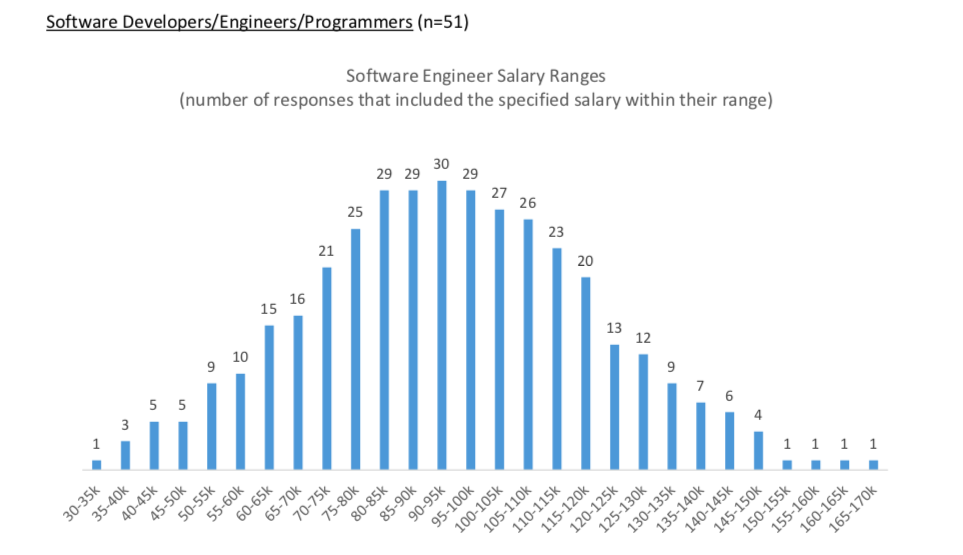
We’ve all seen the news articles touting “crazy” tech salaries on the east and west coasts. We know anecdotally that Ann Arbor and the midwest generally is sheltered from those markets – but by how much? Ann Arbor SPARK recently conducted a survey (in partnership with the Workforce Intelligence Network) for tech companies in Ann Arbor asking specific questions about compensation and benefits for tech talent. The survey garnered 83 responses from tech companies that compete for talent in the Ann Arbor region. The full results and analysis were released to participating companies in mid-April, and here are the top 4 takeaways from the survey that describe the Ann Arbor tech talent marketplace.
- It’s not just about the CV
Ann Arbor tech companies value factors beyond the basics like years of experience, education, and programming languages when hiring tech employees. Other considerations include cultural fit, market-specific project experience, and soft skills.
Experience is the biggest consideration for most survey respondents when deciding on salaries to offer to tech employees, followed by educational background, including certifications. Thirty respondents wrote in additional criteria that they consider, with multiple responses under markets-specific experience, cultural fit, and others. Three respondents base salary decisions on a job candidate’s performance on a technical assessment.
Respondents indicated that factors other than experience, education, and programming languages were more important in their hiring and compensation decisions for tech workers. On a scale from 1 to 4 (where 1 = not considered, 2 = not important, 3 = somewhat important, and 4 = most important), other factors averaged a rating of 3.68. Years of experience (3.40), programming languages (3.20), and education (3.02) are all still important considerations averaging ratings between “somewhat important” and “most important.”
- Companies mainly offer traditional benefits
Most companies surveyed offer traditional compensation and benefits, like salary and vacation time. Other less traditional benefits are offered more frequently when employees negotiate for more professional development opportunities or flex time, for example. Many tech companies also see their flexible and casual work environments as a benefit to employees. Other popular non-traditional benefits include snacks, parking and transit subsidies, and gym memberships.
Traditional benefits, like salary and vacation time, are offered by almost all companies surveyed. Other popular benefits include professional development (87% offer), health benefits (83% offer), and flex time (79% offer). Less common benefits are phone and data plans (33% offer) and the use of a company vehicle (8% offer).
Salary is a highly negotiable benefit among companies surveyed. Some less common benefits like professional development and flex time become available to employees through negotiation.
Beyond the more traditional employee benefits examined above, like salary, vacation time, health insurance, and others, survey respondents provided a variety of responses on “other” benefits provided to employees. The most common was company events, including employee parties, with 10 respondents reporting this as an employee benefit. Free snacks and catered lunches, including lunch & learn sessions, was the next most popular, with 9 respondents indicating a similar benefit is available. For one respondent, free snacks fell under the umbrella of other “general start-up perks” which, in this case, included a foosball table in the office and regular happy hours. Parking or transit subsidies, gym memberships, and a flexible and casual work environment were also top employee benefits among survey respondents. With fewer responses, company equity or profit sharing is a notable employee benefit because of its association with smaller, start-up firms.
- Compensation varies across skill sets and company age
Salaries vary most widely in the technical management and software engineering skill sets. Wage discrepancies across companies surveyed can largely be attributed to the company’s age. Software engineers and executives at start-up tech companies make substantially lower wages than they would at more established companies.

- Ann Arbor tech talent is “sticky”
Most companies (78%) did not cite employee turnover as a struggle. Pay and benefits, fit with company culture, and room for growth were among the most common factors cited by employees leaving the companies.
Just 22% of companies surveyed indicated that they struggle with employee turnover. Two respondents stated that while the larger company may struggle with higher turnover rates the Ann Arbor location tends to be stable, demonstrating both that high-quality talent is available in the Ann Arbor region and that Ann Arbor area companies are competitive in recruiting and retaining talent. Several respondents acknowledged that there has been some employee turnover at their companies but that it is lower than average based on the industry. Finally, multiple respondents were aware of how the company’s efforts in retention (offering more benefits and competitive salaries) improved their turnover rates.
Subscribe to our newsletters
Don’t miss an event, announcement, or job opportunity. Get news delivered to your inbox and stay informed about what is going on in tech, business, and talent in the greater Ann Arbor region.
Subscribe to our newsletters
Don’t miss an event, announcement, or job opportunity. Get news delivered to your inbox and stay informed about what is going on in tech, business, and talent in the greater Ann Arbor region.